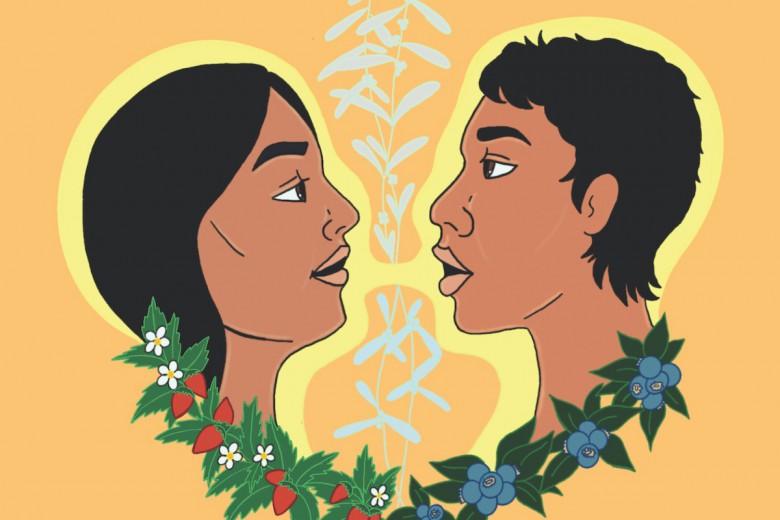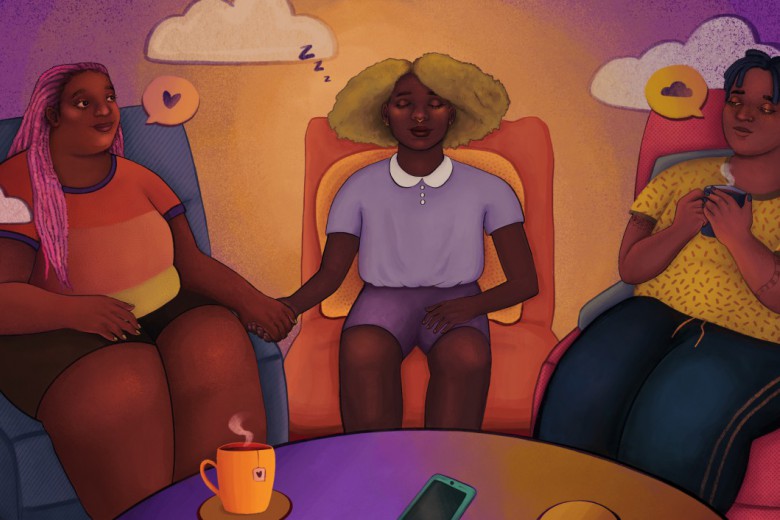For the last 10 years, I have been involved in anti-gender-based violence work and thinking through how we move beyond a consent 101 model that favours “yes means yes” or “no means no.” I was delighted to have the opportunity to read PRUDEmag and learn from co-founders Twoey and Rea, who are thinking and living through a “prude politic” that allows us to unpack sexual normativity, the messiness of consent, solidarities across sexualities (or lack of sexuality), and how we think about pleasure and desire as a society.
Twoey Gray is a Toronto-based urban explorer, Tamagot chi fan club president, poet lady, and woman of aro ace (aromantic asexual) experience. Due to madness, she will be riding her bike for literally ever. Her website is twoeygray.com
Rea Sweets is a Toronto-based multidisciplinary artist. Through tangible, performance, and interactive mediums, her work explores cosmic enchantments and digitality, circling between intimacy, identity, and the imagination. She’s at reasweets.com
For those who haven’t yet had the pleasure of reading PRUDEmag, lets start off with you sharing what “prude” means to you.
Twoey: A prude is a person who rejects sex necessarism – the cultural idea that sex or related sexual demands are necessary. People new to the term “prude” sometimes struggle to conceptual ize this because sexual identity tends to be understood as a profile of individual behaviours and desires. “Prude” invites us to question our sexual landscape and honour our boundaries. Since “prude” is a lens of thinking about sexuality, there are many ways it can be practised, including within sex. It is not necessarily about being asexual or celibate, although those are certainly two experiences contained within the concept of “prude.” Many who have set a boundary in our sexually normative society have been accused of being a prude. We want to turn that pejorative into a badge of honour. It’s a word we’re called when we stand up to expectations and choose ourselves.
Twoey Gray (left) and Rea Sweets (right). Photo courtesy of PRUDEmag._(1)_1000_1250_90.jpg)
Rea: Prude, to me, is a celebration of our autonomy and boundary setting. It’s reclaiming a term used to shame us for asserting our boundaries or having lifestyles that don’t fit into either the sexual status quo or the liberal feminist sex-positive alterna tive. We’re particularly invested in the stuff that tends to be sidelined in the conversation around sexuality like celibacy, radical platonic priority, asexuality, trauma, sexual disabilities, exclusion from the institutions of sex, and oppressive sexual expectations. PRUDEmag also publishes pieces that deal with navigating “no” and “maybe” within sex, like pleasure outside of normative sex and making your own rules. Prude is about power in your truth.
A prude lens respects that consent is nuanced, ongoing throughout any encounter, and includes no and yes.
What stood out to me in the first issue is how you introduced and reclaimed the term prude with the phrase: “Free by our yes. Free by our no.” What does a prude politic teach us about consent?
A graphic made by Twoey Gray for Issue 2 of PRUDEmag._(1)_1000_1000_90.jpg)
Rea: A prude lens respects that consent is nuanced, ongoing throughout any encounter, and includes no and yes. In Issue 2, we included a few critiques of “affirmative consent” as the end-all-be-all of consent discourse. This includes quotes from Katherine Angel’s book where she questioned third-wave feminism’s unreasonable onus on “good consent” between two people to completely overturn patriarchy and white supremacy. A lot of the consent models that became popular in the 2000s and 2010s insisted on a type of consent that was unrealistically vocal and enthusiastic, neglecting that hesitant or anxious or responsive desire can also be consensual. A big part of consent is not the elimination of risk but dignifying risk and making uncertainty safe. We prefer Kai Cheng Thom’s “Spectrum of Consent” as a more prude-friendly model. It acknowledges that sometimes our desires are confusing or difficult to express or dependent on circumstance and can still be empowering.
How do you think prude practice and politics fit into sexual liberation?
Twoey: One major theme in my own prudeness is identifying how dynamics in “the bedroom” replicate themselves outside of it. One example is how Indigenous women in so-called Canada are at incredible risk of sexual violence, which is directly reflected in the exploitation of Indigenous land. If a prude politic is recognizing “no” as a sacred word, it opens the door to many related kinds of righteous refusal.
“Slut” honours saying yes to pleasure, while “prude” honours saying no to expectation. These are often understood as opposite experiences, but many of us are accused of both at different times.
In many ways prudeness works alongside sex positivity. In Issue 2, we published an article by Lisa Millbank who proposes “sex negativity” as a complementary philosophy to sex positivity. While sex positivity may have once had radical origins, its co-optation by pop feminist incarnation tends to glorify the ideal of the white, Western, universally sexually available woman as the epitome of liberation. Cultural practices like modesty become further stigmatized, and racialized women who are hypersexualized by white supremacy find themselves further degraded. We see the prude movement as a response to some of the failures of the sex positivity movement.
Rea: I think feminist sexual liberation, for a long time, has zoned in on just a few select stories. Exercising one’s sexual freedoms has been understood in a “use it or lose it” type of way. You’d hear about people who’ve never been physically intimate, and the entire feminist conversation would be about that person’s “repression” as opposed to that person’s autonomy. Even in some relatively progressive, diaspora-focused magazines, there were always stories about adopting a more Western sexual lifestyle against the wishes of your family, but few about living a less sex-focused life against the wishes of Western culture. Now we’re dealing with the repercussions – people looked for somewhere to question the status quo, and the only available counterculture wasn’t much different from the mainstream pressures.
Solidarity, to me, is building from shared experiences and values, not just shared identity, so that [...] we can approach other experiences with curiosity and empathy.
Some people might be shocked to read about how prudes walk alongside “sluts” and sex workers, thinking they are opposite of each other on a sexuality spectrum. What do you think we can learn about liberation from prude and sex worker solidarity?
_1000_889_90.jpg)
Rea: Sluts and prudes are two sides of the same coin. Our common enemy is the popular belief that our boundaries, lifestyles, and choices are invalid and illogical in the rationale of the sexual status quo. We both face shaming or attempted control of our choices. We all have a lot to learn from each other in how we navigate judgment and paternalism and in how we build ourselves up again and again after each attempted tear down.
I hate the idea of any one being made to feel like they must justify themselves – it seems like for boundaries to be taken seriously, they need to come with works cited.
I appreciated your examples of why someone might identify as a prude and who prude politics can be for, which is everyone from asexual to religious peoples to people who are questioning sexual normativity outside of labels. What have you learned from the prude community about intersectionality and solidarity?
Twoey: We started PRUDEmag from three very different positions. In 2018, I was an asexual aromantic and friend to sluts, and was looking for language to politicize my own experience. Rea was trying to navigate dating and love within a sex-positivity movement that was, at its worst, quite damaging. And Rabeea Syed, our graphic designer from Issue 1, was preparing to move to Montreal, where she knew it would be illegal for her to get certain jobs as a hijabi. “Prude” was a yoke on our shoulders. We wondered, could we be proud to be called prudes? Then Rea and I read this zine called Somali Semantics. The author described the struggle of being super horny while actively practising Islamic celibacy and seeking space to talk about this complexity without the usual white feminist suggestion to abandon her religion. We needed a prude studies textbook and we decided to create this zine, which opened the door to an incredible diversity in reasons people reclaim the word “prude.”
One thing I’ve learned since then is that a multiplicity of perspectives is integral to any movement. A few of our readers pointed out that in Issue 2 we published three pieces with contradictory takes on marriage. One author wrote that marriage should widen to encompass commitments between friends, another wrote that marriage must be abolished, and the third wrote that her decision to abstain from sex until marriage is an important boundary she doesn’t want colonized away. Solidarity, to me, is building from shared experiences and values, not just shared identity, so that when we get to tough questions like these, we can approach other experiences with curiosity and empathy.
Rea: Many perspectives within PRUDEmag are extremely far from my own experiences. When I say the word “prude,” some times people assume a very singular identity that is asexual or low interest in sex, which is far from the truth. We are all so unique in the ways we approach sex, romance, and intimacy. What matters to me is the common stake we all have – a refusal of sex necessarism.
If you were to imagine a society that embraced prude politics and practice, what would that look like?
Twoey: In this current moment, I’m thinking of how the idea of the “prude” shows up again and again in the justification for the genocide in Gaza – for instance, I think of the horrific images of Israeli Occupation Forces soldiers holding up Palestinian women’s underwear. So, the first thing that jumps to mind is no occupation, no imperialism, no genocide. No to oppression globally and at home. On an everyday level, I think one of the greatest gifts of my prudeness as a woman of aro ace experience has been the lessons it has taught me about friendship and community. The expectation that we must have a sexual-romantic partner in order to be taken care of is a symptom of capitalism and colonialism. It has not always been this way. There are and have been other ways. I think people imagine relationship anarchy as this very polyamorous, “free love,” hypersexual philosophy. In prude politics, it’s about rethinking our individualistic, me-and-my-nuclear-family-against-the-world mentality and imagining “love” as your network of community.
Rea: When someone says they’re fully not down or only kind of down for a sexual encounter, their choice should be respected without any need for further inquiry. I hate the idea of any one being made to feel like they must justify themselves – it seems like for boundaries to be taken seriously, they need to come with works cited. Everyone deserves respect that doesn’t make them feel like they’re doing something wrong just for communicating their body’s rules. We also need the freedom to change our rules without explanation. In a prude-positive world, the Bumble anti-celibacy billboard would never have existed. The hierarchy that slots romantic relationships above platonic ones would be replaced by a more radical under standing of intimacy. The many ways we choose to live and approach (or not approach) sex would not come with judg ment of who we really are. The reclamation of “slut” has really tapped into this – I would love to see it on this end of the spectrum too!


_1200_675_90_s_c1_.jpg)


